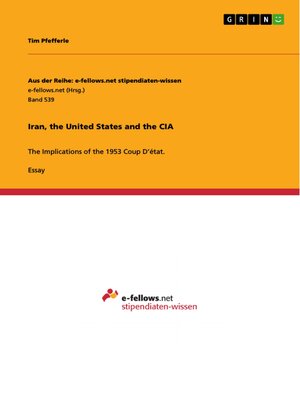Iran, the United States and the CIA
ebook ∣ The Implications of the 1953 Coup D'état. · Aus der Reihe: e-fellows.net stipendiaten-wissen
By Tim Pfefferle

Sign up to save your library
With an OverDrive account, you can save your favorite libraries for at-a-glance information about availability. Find out more about OverDrive accounts.
Find this title in Libby, the library reading app by OverDrive.



Search for a digital library with this title
Title found at these libraries:
| Library Name | Distance |
|---|---|
| Loading... |
Essay from the year 2012 in the subject Politics - Region: Near East, Near Orient, grade: none , University of Miami (Department of Political Science), course: The United States and the Middle East, language: English, abstract: This research paper will analyze the events of mid-August, 1953, during which the CIA conducted a clandestine coup d'etat do remove the democratically elected prime minister of Iran, Mohammad Mossadegh from office and install a more pro-Western regime. The essay will give equal attention to agency and structure, providing an analysis of crucial characters such as Kermit Roosevelt, Shah Mohammed Reza Pahlavi and Mohammed Mossadegh himself, as well as an investigation into the structural underpinnings, which include the Cold War background and Iranian oil resources. Three key implications will be outlined. First, the direct effect on Iran's domestic situation will be delineated. Secondly, the successful 1953 coup will be highlighted as the dawn of more active CIA involvement in the conduct of US foreign policy. Lastly, the coup's implications for the United States' image and scope for policy-making in the Middle East will be analyzed, taking into account its role as a catalyst for the 1978-9 Iranian Revolution and subsequent installment of an Islamic regime.







